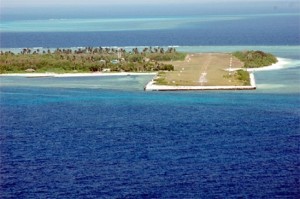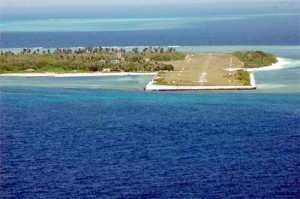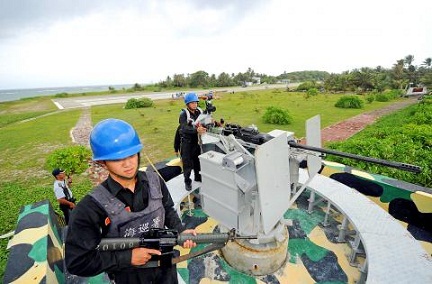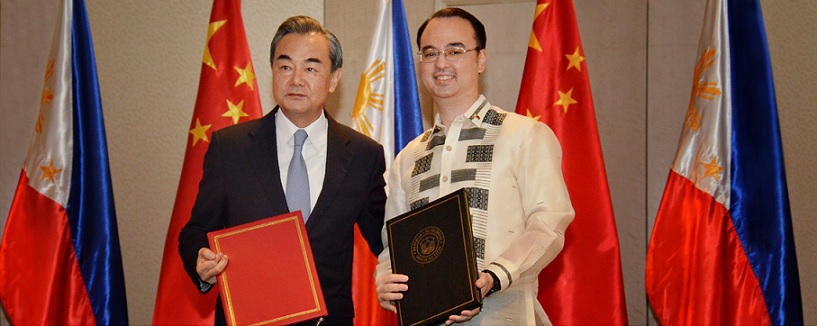By ELLEN TORDESILLAS

IN case there’s a shooting war in the disputed islands of the Spratlys, don’t expect the United States military to come to the aid of the Philippines, South China Sea experts said.
Their reply was in response to a question if the United States military would enter the picture in case of an armed conflict in the South China Sea in the light of the excitement of some Philippine officials and media over the statement of U.S. State Secretary Hillary and U.S. Ambassador Harry Thomas about continuing to work with the Philippines on all issues including related to the South China Sea conflict and stands by the Philippine “by our commitment under the Mutual Defense Treaty.”
This was at the two-day Manila Conference on the South China Sea jointly organized by the Foreign Service Institute of the Philippines, National Defense College of the Philippines, and the Development Academy of Vietnam held at the Dusit Thani Hotel in Makati last week.
Retired General Vinod Saighal of the Indian Army, who is now executive director of the Eco Monitors Society, a non-governmental organization concerned with demography and ecology, said, “Forget the U.S. It will not happen. They are going to sleep.”
Saighal said the U.S. has its hands full with Afghanistan and Libya.
Mark J. Valencia, a fellow at the National Asia Research program, National Bureau of Asia Research and Woodrow Wilson Center (U.S.A) said the U.S. may share intelligence information but he ruled out their sending the U.S. Marines.
Renato de Castro of the De la Salle University recalled the words of former Commander-in-chief of the Pacific Command Charles Larson after the 1991 Philippine Senate decision to terminate the PH-US Military Bases agreement who asked why the Philippines would expect the US to honor their commitment under the MDT after depriving them of their forward base.
But De Castro said the U.S. won’t stand idly in case of hostilities in the South China Sea where a third of the world’s maritime trade pass. “They will not allow the sea lanes of communication to be blocked,” he said.
In his paper presented during the conference,Dato Vice Admiral Noor Aziz Bin Yunan,Difense Konsult PLC, Malaysia cited three reasons for the strategic importance of the SCS: critical trade route,oil reserves and fishery resources, and geo-political strategy.
“Much of the trade between Europe and the Middle East passes from the Indian Ocean through the Malacca Strait, then up through the South China Sea, South Korea, and Japan. Japanese and South Korea defense planners in particular do now want this trade route dominated by China. Japan has shown strong interest for guaranteeing the freedom of trade. This is due to the fact that Japan’s trade and an overwhelming part of the oil Japan imports is transported through the South China Sea. It is in Japan’s interest that not one party gets strong enough to control the trade throughout the region,” he said.
Yunan said recalled that on Dec. 24, 1989, China revealed that the Spratlys contained 25 billion cubic meters natural gas, 105 billion barrels of oil, and 370,000 ton of phosphor.
He said the strategic location of the SCS as an important sea-line-of communications adjacent to choke points of Malacca and Singapore Straits is becoming a zone of competition between China and the United States and the Spratly area has military, economic, and strategic importance for all the parties in the conflict. Paracel and the Gulf of Tonkin have the same strategic importance for Vietnam and China.
“Should one party gain exclusive control over the area, that state would gain total control over the economic development and the trade routes in the region,” Yunan said.
He also said China is seeking naval preponderance in the South China Sea as part of its bid to become a global naval power.
In the meeting of Clinton with Philippine Foreign Affairs Secretary Albert del Rosario in Washington D.C. last month, the former expressed concern over renewed tension in the SCS.
“These reported incidents clearly present significant maritime security issues, including the freedom of navigation, respect for international law, and the lawful, unimpeded economic development and commerce that all nations are entitled to pursue.”
She reiterated U.S. policy: “Our position on the South China Sea has been consistent and clear. We support a collaborative diplomatic process by all claimants to resolve their disputes without the use or threat of force.”
Clinton also made clear the U.S. position on the conflicting claims of the Philippines, China, Vietnam, Malaysia, Brunei and Taiwan: “And as I’ve said, we don’t, as the United States, take a position on competing sovereignty claims over land features. And as the secretary said, there is customary international law; there is the law of the seas. What is theirs is theirs and then what is disputed should be resolved peacefully.
However, if there are claimants to land or sea features, then they should respect the international law and do everything we can to try to resolve these disputes because, ultimately, territorial disputes have to be resolved by the claimants. But the United States is prepared to support the initiatives led by ASEAN and work with the South China Sea’s claimants to meet their concerns.”
Col. Galileo Gerard Kintanar, Jr. of the Philippine Air Force asked about a worst-case scenario in the SCS. Peter A. Dutton, Associate Professor, China Maritime Studies Institute, U.S. Naval War College, Hasjim Djalal of the Indonesian Maritime Council and Carolina Hernandez of the Institute for Strategic and Development Studies, Philippines ruled out an all-out-war.
But Dutton and Hernandez warned of “unintended flare-ups.”
“Small incidents that get out of control,” Dutton said.
Dutton said there is no “shortage of good aspirations” to find solutions to make SCS a zone of peace, freedom and cooperation.
However, he said, “There appears to be a shortage of political will to find compromise and all sides are using naval power to send signals of resolve.”
He added:”If parties are to stave off conflict, the answer lies not in the win-lose propositions of sovereignty and jurisdiction, but in finding answers in some of the examples of win-win frameworks that would regionalize the territory and waters of the South China Sea, allow common development of the living and non-living resources, and provide for shared enforcement of laws.”
The alternative, Dutton said, “is as it ever has been – that the strong will do what they can and the weak will do what they must.”



